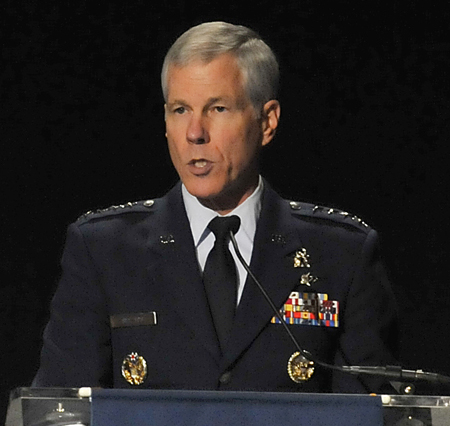Gen.  William Shelton, head of Air Force Space Command, reiterated to members of the House Armed Services Committee’s strategic forces panel on Thursday the importance of protecting portions of the electromagnetic spectrum vital to national security. Rep. Michael Turner (R-Ohio), panel chairman, asked Shelton about the ongoing saga with LightSquared, the company whose proposed terrestrial wireless broadband network government testers found would disrupt the Global Positioning System signal for military and civilian GPS users within the United States. “That part of the spectrum has to be protected, whether that’s by policy within the [Federal Communications Commission] or legislation,” responded Shelton, referring to the spectrum in which the GPS signal operates. He added, “There is no question, we have to protect that part of the spectrum.” Congress enacted a provision last year that prohibited the FCC from allowing LightSquared to move forward with its network until all concerns were resolved. Subsequent to that, FCC announced on Feb. 14 that “there is no practical way to mitigate potential interference at this time” between LightSquared’s network and GPS. LightSquared now has until March 30 to file its response.
William Shelton, head of Air Force Space Command, reiterated to members of the House Armed Services Committee’s strategic forces panel on Thursday the importance of protecting portions of the electromagnetic spectrum vital to national security. Rep. Michael Turner (R-Ohio), panel chairman, asked Shelton about the ongoing saga with LightSquared, the company whose proposed terrestrial wireless broadband network government testers found would disrupt the Global Positioning System signal for military and civilian GPS users within the United States. “That part of the spectrum has to be protected, whether that’s by policy within the [Federal Communications Commission] or legislation,” responded Shelton, referring to the spectrum in which the GPS signal operates. He added, “There is no question, we have to protect that part of the spectrum.” Congress enacted a provision last year that prohibited the FCC from allowing LightSquared to move forward with its network until all concerns were resolved. Subsequent to that, FCC announced on Feb. 14 that “there is no practical way to mitigate potential interference at this time” between LightSquared’s network and GPS. LightSquared now has until March 30 to file its response.
The Air National Guard will deactivate an air control squadron in Georgia and dozens more in Iowa, converting the unit and positions to do cyber operations.